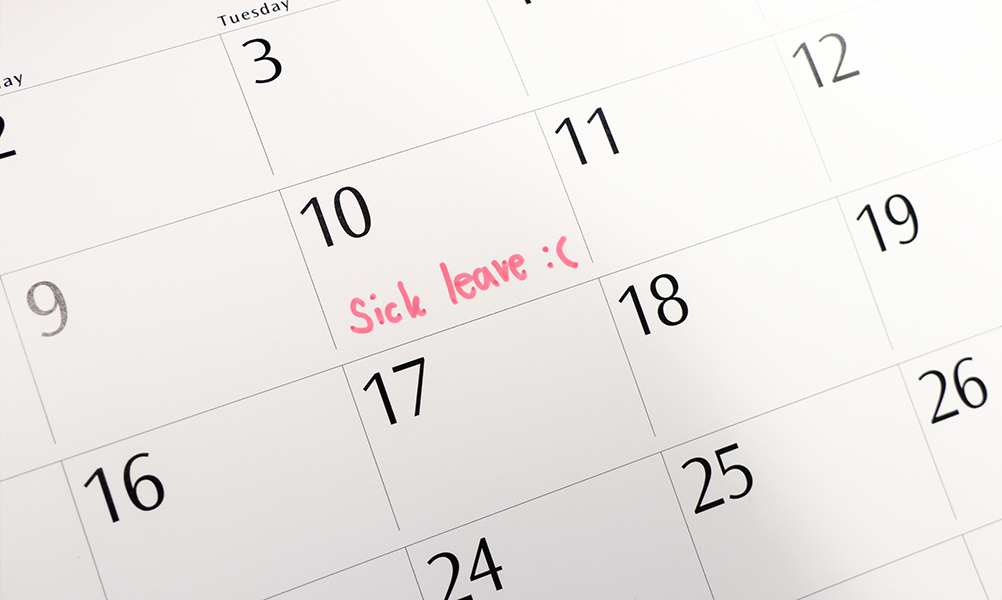A Guide to Sick Pay for the Self-employed or Company Directors
Posted 3 years ago by Tracy

When self-employed or running a small business, taking time off sick can seem like an impossibility, but sometimes it simply cannot be avoided. If that time arises, being aware of your rights and the support you’re entitled to can make a huge difference during what is likely to be a stressful situation. In addition, spending some time now to plan for a worst-case scenario will likely pay off in the long term.
Statutory Sick Pay
The first thought for many when it comes to financial support when poorly will be Statutory Sick Pay (SSP); SSP is set at £96.35 for up to 28 weeks and is subject to tax and national insurance deductions if you exceed your tax-free allowance. Unfortunately, however, not everyone is entitled to SSP.
Am I entitled to Statutory Sick Pay?
While limited company directors are able to claim SSP, self-employed workers are not. To qualify for support as a limited company director, you must have been ill for at least four days in a row – the first three days you’re sick are known as ‘waiting days’. You can then claim SSP from the fourth day. You only get paid for waiting days if you’ve already received SSP within the last eight weeks and that included a three-day waiting period.
Claimants need to earn an average salary of at least £118 a week and can’t be receiving statutory maternity, paternity, adoption or additional paternity pay.
It should be noted that there are different rules in place when it comes to self-isolating or being unable to work because of Covid-19. Here you must self-isolate for at least four days to be eligible, but you will receive SSP for each day you have to isolate.
Sick pay options for the self-employed
While SSP isn’t an option for self-employed individuals, there is support available in the form of the Employment and Support Allowance (ESA). While previously there were three types of ESA, you will now only have the option of applying for ‘new style’ ESA, which is not means-tested but is taxable. It can also be claimed alongside Universal Credit.
Again, some criteria have to be met to receive this. You must submit ‘fit notes’ signed by your doctor, confirming you cannot work as normal. You must be under state pension age, have a health condition or disability that affects your ability to work and have paid National Insurance Contributions in the previous two to three years. How much you get will depend on what stage your application is at and factors such as your age and whether you’re able to get back into work.
Claimants will generally get the ‘assessment rate’ for 13 weeks while the claim is being considered. This is up to £59.20 a week for the under 25s and £74.70 a week for those over 25. Suppose the assessment takes longer than 13 weeks. In that case, you’ll continue getting the assessment rate until you receive a decision. However, your ESA will be backdated if you’re owed any money after 13 weeks.
If it’s deemed that you’re eligible for ESA, you’ll be placed into one of two groups. The work-related activity group means you’re able to get back into work in the future and pays up to £74.40 a week, while those deemed unable to return to work will be placed in the support group and will receive £114.10 a week. The money will be paid directly into your bank account every two weeks.
You can apply for ESA by contacting the Universal Credit Helpline to make an appointment with a work coach or check if you’re eligible and apply online.
Can I still work while claiming ESA?
If you work less than 16 hours a week and earn less than £143 a week, you can work while claiming ESA, although you must inform your work coach when you make a claim.
You can work more than 16 hours a week if the work is voluntary or classed as ‘supported permitted work’, whereby the work is supervised by someone from a local council or voluntary organisation who arranges work for disabled people or part of a treatment programme under medical supervision. You still cannot earn more than £143 a week, however.
What other options are available?
While SSP and ESA can provide a much-needed cash boost when you’re unable to work, chances are they won’t cover your usual bills and outgoings. With this in mind, it can be good to consider company director sickness insurance or income protection insurance for the self-employed. This will provide you with a monthly income should you fall ill or have an accident leaving you unable to work. Terms of policies vary, but you can expect to receive up to 60% of your usual income with options for short-term or long-term plans. Other options would be critical illness cover, life insurance and/or mortgage protection insurance.
Further Reading
2024 Spring Budget: What does it mean for small businesses?